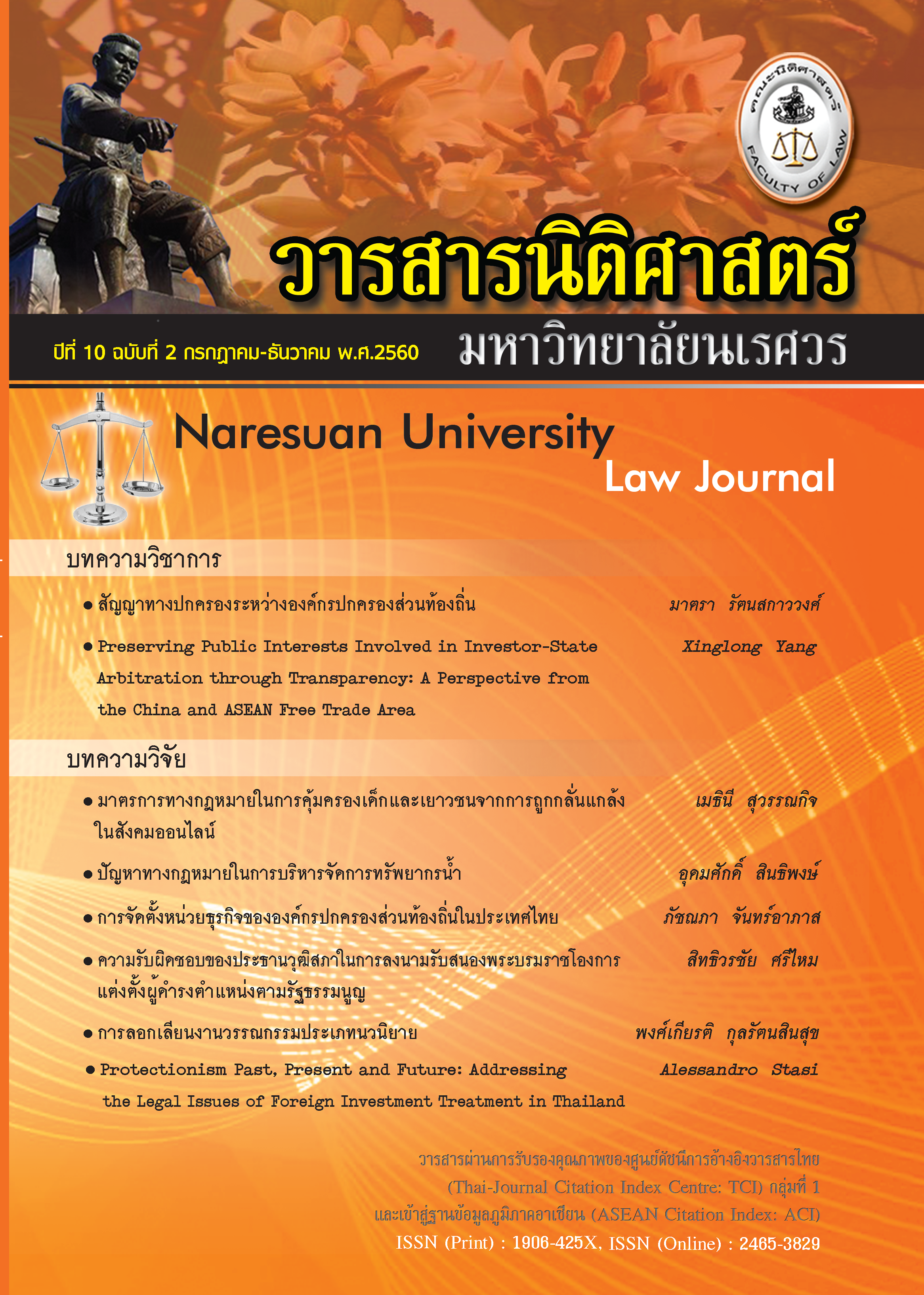Protectionism Past, Present and Future: Addressing the Legal Issues of Foreign Investment Treatment in Thailand
Main Article Content
บทคัดย่อ
The aim of this paper is to discuss and critically analyze the legal hurdles posed by Thailand’s Foreign Business Act B.E. 2542 (A.D. 1999) in the light of the relevant international legal framework. The first part of the paper reviews the three lists of business activities which are regulated under the Foreign Business Act and outlines the types of activities in which foreign participation is restricted or prohibited. It points out the several conditions that a foreigner must fulfill in order to operate a business in Thailand if the business activity falls under the scope of the Foreign Business Act B.E. 2542 (A.D. 1999).
The second part of the paper discusses the engagements of Thailand in a number of international agreements which grant special exemptions to the Foreign Business Act with particular focus on the key legal issues related to the Treaty of Amity and Economic Relations between Thailand and the United States, the ASEAN Framework Agreement on Services and the ASEAN Comprehensive Investment Agreement.
The third part of the paper looks at some of the practical issues which arise when foreign investors design preference share structures which are believed to be in compliance with the requirements of the Foreign Business Act and the Civil and Commercial Code. More precisely, it focuses on the three most common share structures (i.e. nominee shareholding, preference shareholders schemes and super minority quorum rules) and suggests that the preference share scheme appear to provide a perfect combination between Thai ownership and foreign control of the business activity. As there are high chances that new protectionist measures will be adopted in a near future, the last part of the paper assesses the effects that these amendments may have on existing Thai registered juristic persons with foreign participation and control as well as their impacts on international treaties.
Article Details
เอกสารอ้างอิง
Text_26%20Feb%202009.pdf.
Association of Southeast Asian Nations. “ASEAN Framework Agreement on Services.” Last modified December 28, 2017. Accessed April 28, 2017. https://asean.org/news/item/asean-framework-agreement-on-services.
Campbell, Dennis. Comparative Law Yearbook of International Business Cumulative Index. Vol. 25. The Hague: Kluwer Law International.
Chang, Albert Vincent Y. Yu, and Andrew Thorson, eds. A Legal Guide to Doing Business in the Asia-Pacific. Chicago: American Bar Association, 2010.
Findlay, ChristopherSherry Stephenson, and Francisco Javier Prieto. “Services in Regional Trading Arrangements.” In The World Trade Organization: Legal, Economic and Political Analysis, 1888-1907. New York: Springer, 2005.
Frost, Stephen. “Bangkok International Associates Thailand’s Foreign Business Act - Will It Ever Change?.” Last modified 2013. Accessed April 28 2017. https://www.bia.co.th/legalupdates2013.html.
Herbert Smith Freehills. “Foreign Investment Attractiveness, Improving the Foreign Investment regime.” Last modified November 11, 2014. Accessed April 28, 2017. https://www.swecham.com/news/all-latest-news/item/download/
22_bd7178a71eb960ed20ec37bd0e5c22d7.html.
Inc, Ibp. Thailand: Doing Business and Investing in Thailand Guide, Volume 1 Strategic, Practical Information and Contacts. Washington, DC: Int’l Business Publications, 2012.
Kategekwa, Joy. Opening Markets for Foreign Skills: How Can the Wto Help?. New York: Springer, 2014.
Krajewski, Markus. National Regulation and Trade Liberalization in Services: The Legal Impact of the General Agreement on Trade in Services (Gats) on National Regulatory Autonomy. The Hague: Kluwer Law International, 2003.
Nop Tephaval. “Prayut Backtracks on Fba Changes. Some Work Permit Rules to Be Altered.” Bangkok Post, December 4, 2014. Accessed April 27, 2017. https://www.pressreader.com/thailand/bangkok-post/20141204/282003260749024.
Nurridzki, Nanda. Learning from the Asean+ 1 Model and the Acia. Indonesia: ERIA, 2015.
Pawin Talerngsri, and Pimchanok Vonkhorporn. “Trade Policy in Thailand: Pursuing a Dual Track Approach.” ASEAN Economic Bulletin, (2005): 60-74.
Reading, Michael R. “The Bilateral Investment Treaty in Asean: A Comparative Analysis.” Duke Law Journal 42, no. 3 (1992): 679-705.
Solomon, Lewis D., and Alan R. Palmiter. Corporations: Examples and Explanations. New York: Aspen Publishers, 2009.
Stasi, Alessandro. Principles of Thai Business Law. Singapore: Cengage, 2015.
Sudarat Ananchotikul. Does Foreign Investment Really Improve Corporate Governance? Evidence from Thailand. Berkeley: University of California, 2007.
Sukontharat Nobnom. “What Management Should Know.” The Nation. August 4, 2016. Accessed January 8, 2017. https://www.nationmultimedia.com/news/business/EconomyAndTourism/30292078(7).
Suthiphon Thaveechaiyagarn. “Wto Application in Thailand : Right Direction Towards Fair Trade Liberalization.” The Intellectual Property and International Trade Law Forum Seventh Anniversary Current Issue, (2004): 301-323.
The World Bank. “East Asia and Pacific Economic Update April 2014: Preserving Stability and Promoting Growth.” Last modified April 7, 2014. Accessed April 28, 2017. https://documents.worldbank.org/curated/en/256651468248662652/East-Asia-Pacific-economic-update-April-2014-preserving-stability-and-promoting-growth.


